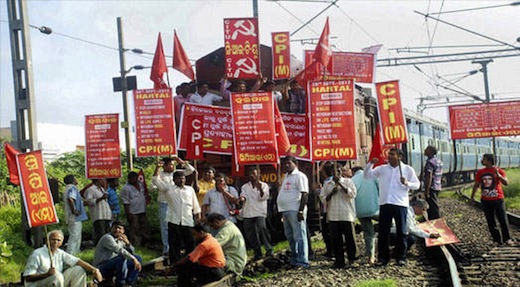
In a rare spirit of unity, an estimated 50 million storeowners across India shut down their shops Sept. 20 to protest the government’s decision to allow foreign companies like Walmart access to the nation’s retail market. The financial loss of the one-day strike was estimated at $ 2.25 billion.
“Kolkata, Bangalore, and Chennai were among cities most affected by the 24-hour strike, with the majority of shops, factories, schools and offices shut down for the day,” reports The Hindu.
Tens of millions of storeowners, in every town in India, are in danger of losing their family-owned businesses to the U.S.-based retail giant and its counterparts like United Kingdom-based Tesco. India has a deep tradition of neighborhood shopping centers that has helped sustain the growth of its middle class.
Shop owners fear Walmart will flood the market with cheap goods from China, hastening a trend that has already put pressure on India’s manufacturing centers and increasing India’s negative trade balance with China.
In addition, shopkeepers know of the trends in the United States when Walmart goes into a community and puts small stores out of business with a net result of job losses.
The Indian Chamber of Commerce along with the Congress-led coalition government argue that Walmart and other superstore giants will create millions of jobs.
There is political fallout from the government’s decision. The left parties, which broke with the government a few years ago over the India-U.S. nuclear deal, have been leading the opposition to the decision and called for the one-day strike. Other political parties joined the protests, with government allies walking out to join the left opposition. Leaders of eight political parties, including the two leading Communist parties, CPI and CPM, were arrested during the protests.
Feeling pressure from constituents, anti-Communist Mamata Banerjee and her Trinamool Congress party formally withdrew from the ruling coalition government, pulling out its six ministers, and demanding the government reverse its decision.
Two other unpopular decisions, one that raises the price of diesel fuel and the other that limits the number of gas cylinders supplied to families in need, are also being protested. The left parties say the government is following anti-people neoliberal economic policies of privatization and allowing capital to have a free rein.
But the United Progressive Alliance government says it’s going ahead with implementing its decisions and is “willing to go down fighting,” although the prime minister says his majority is not in danger, despite Trinamool Congress’ withdrawal. Such confidence indicates that at least one opposition party has agreed to vote for the ruling party if a no-confidence vote comes to pass. Some of these opposition leaders are under investigation for corruption, suggesting they won’t defy the will of the ruling coalition.
Photo: Left activists stop a train in Bhubaneswar, Orissa, during the Sept. 20 one-day strike. (Ganashakti)












Comments